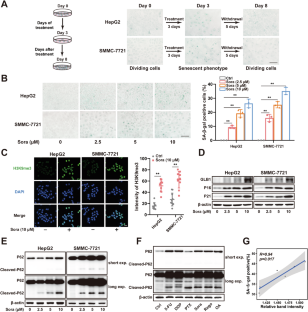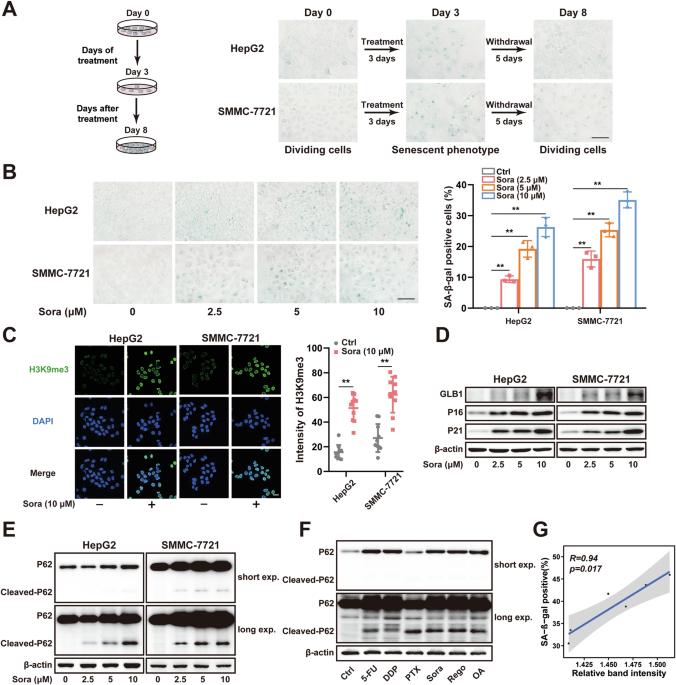索拉非尼介导的p62裂解引发细胞衰老是一种逃避其抗肝细胞癌疗效的机制。
IF 6.9
1区 医学
Q1 BIOCHEMISTRY & MOLECULAR BIOLOGY
引用次数: 0
摘要
肝细胞癌(HCC)是最具侵袭性和致命性的恶性肿瘤之一。目前,索拉非尼已被批准作为晚期肝癌的主要治疗手段,但其耐药性是一个严峻的挑战。以往的研究表明,索拉非尼停药后的反弹与耐药性的产生之间存在联系,但其潜在的机制仍然难以捉摸。在本研究中,我们发现索拉非尼诱导了HCC细胞的衰老表型,并导致泛素结合蛋白p62裂解。机理研究证实,截短的p62通过促进蛋白酶体依赖性降解4EBP1来驱动细胞衰老。此外,截短的 p62 还能诱导 4EBP1 发生特异性泛素化。重要的是,虚拟药物筛选发现,达西诺司他通过阻断索拉非尼诱导的p62裂解来抑制细胞衰老。总之,我们的研究结果表明,索拉非尼裂解产生的截短p62通过4EBP1降解促进衰老。防止p62裂解可能成为阻碍索拉非尼诱导的细胞衰老的重要策略。本文章由计算机程序翻译,如有差异,请以英文原文为准。


Sorafenib-mediated cleavage of p62 initiates cellular senescence as a mechanism to evade its anti-hepatocellular carcinoma efficacy
Hepatocellular carcinoma (HCC) stands as one of the most aggressively advancing and lethal malignancies. Sorafenib is presently endorsed as a primary therapy for advanced liver cancer, but its resistance presents a formidable challenge. Previous studies have implicated a connection between post-sorafenib discontinuation rebound and the development of drug resistance, yet the underlying mechanism remains elusive. In this study, we discerned that Sorafenib induced a senescent phenotype in HCC cells and caused a cleavage of ubiquitin-binding protein p62. Mechanistic studies establish that truncated p62 drives cellular senescence by promoting proteasome-dependent degradation of 4EBP1. Furthermore, truncated p62 induced specific ubiquitination of 4EBP1. Crucially, virtual drug screening uncovered that dacinostat inhibited cellular senescence by blocking sorafenib-induced p62 cleavage. In summary, our findings imply that truncated p62 from sorafenib cleavage promotes senescence via 4EBP1 degradation. The prevention of p62 cleavage could emerge as a crucial strategy for impeding the sorafenib-induced cellular senescence.
求助全文
通过发布文献求助,成功后即可免费获取论文全文。
去求助
来源期刊

Oncogene
医学-生化与分子生物学
CiteScore
15.30
自引率
1.20%
发文量
404
审稿时长
1 months
期刊介绍:
Oncogene is dedicated to advancing our understanding of cancer processes through the publication of exceptional research. The journal seeks to disseminate work that challenges conventional theories and contributes to establishing new paradigms in the etio-pathogenesis, diagnosis, treatment, or prevention of cancers. Emphasis is placed on research shedding light on processes driving metastatic spread and providing crucial insights into cancer biology beyond existing knowledge.
Areas covered include the cellular and molecular biology of cancer, resistance to cancer therapies, and the development of improved approaches to enhance survival. Oncogene spans the spectrum of cancer biology, from fundamental and theoretical work to translational, applied, and clinical research, including early and late Phase clinical trials, particularly those with biologic and translational endpoints.
 求助内容:
求助内容: 应助结果提醒方式:
应助结果提醒方式:


